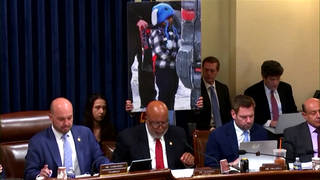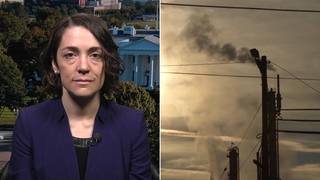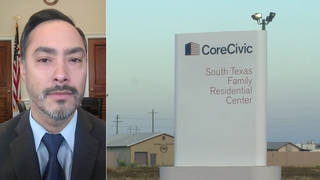
A new study projects as many as 20 million people could lose Medicaid coverage under a Republican congressional bill to cut the Affordable Care Act’s Medicaid expansion match rate. The Center on Budget and Policy Priorities found the bill includes tax cuts for the wealthy and businesses, paired with cuts on the programs that support low-income Americans. “There is a direct link between their desire to extend very expensive tax cuts for very wealthy people and the cuts they are putting on the table that will take health coverage and food assistance away from people that struggle to afford the basics,” says Sharon Parrott, president of the Center on Budget and Policy Priorities.
Transcript
AMY GOODMAN: This is Democracy Now!, democracynow.org. I’m Amy Goodman, with Juan González.
In health news, a new study is projecting as many as 20 million people could lose Medicaid coverage under a Republican congressional bill to cut the Affordable Care Act’s Medicaid expansion match rate. Republicans are also pushing for work requirements for Medicaid recipients. The American Hospital Association has harshly criticized proposals to cut funding for Medicaid, saying, “Medicaid provides health care to many of our most vulnerable populations, including pregnant women, children, the elderly, disabled and many of our working class,” unquote.
We’re joined now by Sharon Parrott, president of the Center on Budget and Policy Priorities. She formerly worked at the Department of Health and Human Services and OMB, the Office of Management and Budget.
Sharon, if you can start off by talking about the significance of this congressional bill? I think what’s missing in all these national discussions is the true effect on people and how many people, what Medicaid — who it’s for.
SHARON PARROTT: Yeah, I couldn’t agree more. Thank you so much for having me this morning.
There are 72 million people in the United States that get health coverage through Medicaid. And there are many proposals moving through Congress that would take coverage away from potentially millions of people, leaving them without coverage.
And I want to drill down for just a moment on what it means to be without health coverage. When Medicaid is taken away, what does that mean? It means a parent who can’t get cancer treatment. It means a young adult, just starting out, who can’t get insulin to control their diabetes, just absolutely essential for them to be able to work and move up the economic ladder. It means older adults and people with disabilities losing the care they get in their homes so that they don’t have to move into nursing homes and institutions. It means workers who can’t get access to mental health treatment.
Medicaid provides lifesaving care and access to coverage that is both primary care and acute care. It helps people control chronic diseases, and it helps them thrive. And so, when you hear all the numbers and the hundreds of billions of dollars that are being proposed to be cut, the tens of millions of people that could lose coverage, it’s important to remember what that means to an individual and to their family.
JUAN GONZÁLEZ: I wanted to ask you about the impact, the potential impact, on Medicare, as well, because Republicans are more and more interested in shifting more retired people into Medicare Advantage rather than the regular Medicare system, which is, in essence, privatizing much of Medicare.
SHARON PARROTT: Yeah, we’ve seen a real shift over the last several decades in people moving from traditional Medicare to Medicare Advantage. And there are real issues emerging with Medicare Advantage, including that it is more costly for the federal government than traditional Medicare. And unfortunately, people often have healthcare access issues within Medicare Advantage.
But I think what we’re going to see this year is a more targeted approach, really targeting cuts in Medicaid, which is our healthcare coverage system for people with low and moderate incomes. And as you said at the beginning, it is kids, it is adults, it is parents, it is workers, it is seniors, and it is people with disabilities. Medicaid is an important linchpin in our health coverage system, covering, again, 72 million people, including 20 million of whom are now getting coverage because of the Affordable Care Act’s Medicaid expansion, very much in the crosshairs for some Republican members of Congress.
JUAN GONZÁLEZ: And most people don’t realize that a lot of the spending cuts are basically as a result of the tax cuts initiated during the first Trump administration that are about to expire. And so, Congress — and, of course, most of that went to the wealthiest Americans. Could you talk about that, this expiration of these cuts?
SHARON PARROTT: Absolutely. So, in 2017, massive tax cuts were enacted. Those tax cuts were very expensive, and they were highly skewed towards wealthy people and profitable corporations. Many of those tax cuts, particularly the tax cuts that relate to individual people and some business tax cuts, are due to expire at the end of this year. And Republicans in Congress are trying to put forward a budget plan that, overall, would not only extend those tax cuts, but make them larger. And to offset some of the costs, they’re pointing to making massive cuts in things like health coverage and food assistance for some of our lowest-income households in the country.
The cuts they are proposing in Medicaid and food assistance equals the cuts — the tax cuts that they want to make or extend for the people in the top 1% of income. So, there is a direct link between their desire to extend very expensive tax cuts for very wealthy people and the cuts they are putting on the table that will take health coverage and food assistance away from people that struggle to afford the basics. Just to give you a little bit of a sense of how discordant this is, households in the top 1% of the income distribution have incomes of more than $740,000. The tax cut alone for those folks would average $62,000, which is more than the entire income of most people that benefit from Medicaid and from food assistance through the SNAP program. That is how imbalanced this agenda is.
AMY GOODMAN: Sharon, last Thursday, former Trump adviser Steve Bannon warned on his podcast War Room that Medicaid is a complicated program to cut. This is what he said.
STEVE BANNON: Get into that discretionary spending. Get into the Pentagon. Get into Medicaid. Medicaid, you’ve got to be careful, because a lot of MAGA is on Medicaid. I’m telling you, if you don’t think so, you are dead wrong. Medicaid is going to be a complicated one. Just can’t take a meat ax to it, although I would love to.
AMY GOODMAN: So, one of the points he made is that many MAGA supporters, many Trump supporters, are on Medicaid. He also called Elon Musk a “parasitic illegal immigrant.” But the significance of what he said, in this last minute, Sharon Parrott, what he’s representing within the Republican Party? As I speak to lobbyists who are pushing for Medicaid, talking to Republican congressmembers and their staff, these congressmembers’ staff understand well they’re in trouble on this.
SHARON PARROTT: Look, Medicaid provides health coverage, lifesaving health coverage, to 72 million Americans. That is more than one in four people in the United States. People in every state, people in every community, people of all ages, people of all races and ethnicities get health coverage through Medicaid.
And so, what I think Mr. Bannon was referring to is that millions of people will be adversely affected by cuts that take coverage away from people. Those are the people that are directly impacted, that have coverage, that will lose it and their access to healthcare. And it is also their family members, who, when their family members lose Medicaid, extended family have to try to scrimp and save and bring together resources that they don’t have when someone has a life-threatening health condition or a chronic condition. And so, the ripple effects of Medicaid are vast.
It is an essential part of our health coverage system. And policymakers should not want to take health coverage away from people for whom the cost of healthcare and food is far more important to them than the performance of the Dow Jones Industrial Average.
AMY GOODMAN: Sharon Parrott, I want to thank you for being with us, president of the Center on Budget and Policy Priorities. I’m sure we’re going to be calling on you again.













Media Options